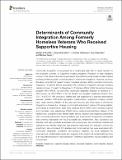Determinants of Community Integration Among Formerly Homeless Veterans Who Received Supportive Housing
Author(s)
Glasmeier, Amy
DownloadPublished version (878.5Kb)
Publisher with Creative Commons License
Publisher with Creative Commons License
Creative Commons Attribution
Terms of use
Metadata
Show full item recordAbstract
Community integration is recognized as a meaningful goal that is highly relevant to the long-term success of supportive housing programs. Research to date highlights concerns that some individuals in permanent supportive housing remain socially isolated and have limited success in other domains of community integration. However, we know little about what factors impact formerly homeless veterans' ability to achieve community integration. To identify factors associated with community integration among homeless veterans housed through the Department of Veterans Affairs' (VA's) Supportive Housing program (HUD-VASH), we performed secondary database analyses of Veterans (n = 560) housed via HUD-VASH in the VA Greater Los Angeles Healthcare System from 10/1/14-9/30/15. We conducted ordinal and logit regressions to examine associations between baseline HUD-VASH participant characteristics, supportive housing voucher type, health service utilization in the year post-housing, and three types of community integration outcomes (i.e., change in community adjustment, status of housing stability, and change in employment). Data were obtained from HOMES (VA's homeless registry) and Corporate Data Warehouse (CDW) (VA's a national administrative dataset of VA inpatient and outpatient care). Mental health service utilization was negatively associated with community adjustment, housing stability, and employment. Employment at baseline was positively associated with housing stability and employment. Also, substance use disorder visits was positively associated with employment, and combined medical and substance use disorder diagnoses was positively associated with change in community adjustment. We considered 29 variables and found relatively few were associated with community integration. Consistent with previous research, our study highlights the importance of mental health needs, and suggests that utilization of mental health services is an important indicator of improvements in community adjustment, housing stability, and employment.
Date issued
2019-06Department
Massachusetts Institute of Technology. Department of Urban Studies and PlanningJournal
Frontiers in Psychiatry
Publisher
Frontiers Media SA
Citation
Chinchilla, Melissa et al. “Determinants of Community Integration Among Formerly Homeless Veterans Who Received Supportive Housing.” Frontiers in Psychiatry, 10 (June 2019): 472 © 2019 The Author(s)
Version: Final published version
ISSN
1664-0640